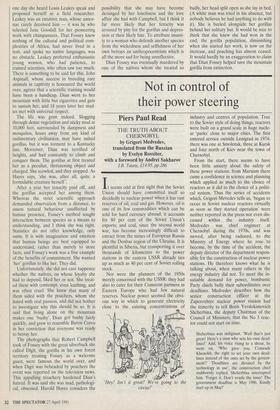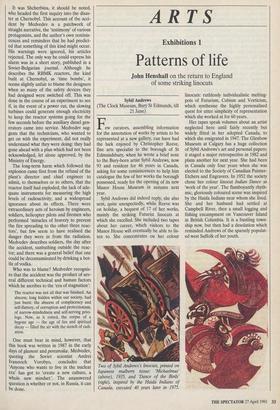Not in control of their power steering
Piers Paul Read
THE TRUTH ABOUT CHERNOBYL by Grigori Medvedev, translated from the Russian by Evelyn Rossiter, with a foreword by Andrei Sakharov I.B. Tauris, £14.95, pp.286 It seems odd at first sight that the Soviet Union should have committed itself so decidedly to nuclear power when it has vast reserves of oil, coal and gas. However, oil is one of its few commodities which can be sold for hard currency abroad: it accounts for 80 per cent of the Soviet Union's exports; and coal, since the second world war, has become increasingly difficult to extract from the mines of European Russia and the Donbas region of the Ukraine. It is plentiful in Siberia, but transporting it over thousands of kilometres to the power stations in the eastern USSR already ties up as much as 40 per cent of Soviet rolling stock.
Nor were the planners of the 1950s merely concerned with the USSR: they had also to cater for their Comecon partners in Eastern Europe who had few natural reserves. Nuclear power seemed the obvi- ous way in which to generate electricity close to the existing concentrations of 'Hey! Isn't it great? We're going to the circus!' industry and centres of population. True to the Soviet style of doing things, reactors were built on a grand scale in huge nucle- ar 'parks' close to major cities. The first entered service outside Lenigrad in 1974: there was one at Smolensk, three at Kursk and four north of Kiev near the town of Chernobyl.
From the start, there seems to have been little anxiety about the safety of these power stations: from Marxism there came a confidence in science and planning which applied as much to the choice of reactors as it did to the choice of a politi- cal system. Thus the series of accidents which, Grigori Mevedev tells us, 'began to occur in Soviet nuclear reactors virtually as soon as they started operation' were neither reported in the press nor even dis- cussed within the industry itself. Medvedev was chief engineer at Chernobyl during the 1970s, and was moved, after being radiated, to the Ministry of Energy where he rose to become, by the time of the accident, the deputy director of the department respon- sible for the construction of nuclear power stations. He therefore knows what he is talking about, when many others in the energy industry did not. To meet the in- satiable demand for power, bombastic Party chiefs bully their subordinates over deadlines. Medvedev describes how the senior construction officer at the Zaporozhiye nuclear power station had the temerity to tell Boris Yevdokimovich Shcherbina, the deputy Chairman of the Council of Ministers, that the No 3 reac- tor could not start on time.
Shcherbina was indignant. 'Well that's just great! Here's a man who sets his own dead- lines!' And, his voice rising to a shout, he went on, 'Who gave you, Comrade Khenokh, the right to set your own dead- lines instead of the ones set by the govern- ment?' Deadlines are dictated by the technology in use', the construction chief stubbornly replied. Shcherbina interrupted him. 'Forget it. Don't evade the issue! The government deadline is May 1986. Kindly start up in May!'
It was Shcherbina, it should be noted, who headed the first inquiry into the disas- ter at Chernobyl. This account of the acci- dent by Medvedev is a patchwork of straight narrative, the 'testimony' of various protagonists, and the author's own reminis- cences and reminders that he had predict- ed that something of this kind might occur. His warnings were ignored, his articles rejected. The only way he could express his alarm was in a short story, published in a Soviet-Bulgarian journal. Although he describes the RBMK reactors, the kind built at Chernobyl, as 'time bombs', it seems slightly unfair to blame the designers when so many of the safety devices they had designed were switched off. This was done in the course of an experiment to see if, in the event of a power cut, the slowing turbines could generate enough electricity to keep the reactor systems going for the few seconds before the auxiliary diesel gen- erators came into service. Medvedev sug- gests that the technicians, who wanted to get on with the experiment, did not really understand what they were doing: they had gone ahead with a plan which had not been acknowledged, let alone approved, by the Ministry of Energy.
The long-term harm which followed the explosion came first from the refusal of the plant's director and chief engineer to admit, to themselves or to others, that the reactor itself had exploded; the lack of ade- quate instruments for measuring the high levels of radioactivity; and a widespread ignorance about its effects. There were extraordinary acts of heroism by engineers, soldiers, helicopter pilots and firemen who performed 'miracles of bravery to prevent the fire spreading to the other three reac- tors', but few seem to have realised the danger they were in from the radiation. Medvedev describes soldiers, the day after the accident, sunbathing outside the reac- tor; and there was a general belief that one could be decontaminated by drinking a bot- tle of vodka.
Who was to blame? Medvedev recognis- es that the accident was the product of sev- eral different technical and human factors which he ascribes to the 'era of stagnation': The reactor was not all that was finished. An abscess, long hidden within our society, had just burst: the abscess of complacency and self-flattery, of corruption and protectionism, of narrow-mindedness and self-serving privi- lege. Now, as it rotted, the corpse of a bygone age — the age of lies and spiritual decay — filled the air with the stench of radi- ation.
One must bear in mind, however, that this book was written in 1987 in the early days of glasnost and perestroika. Medvedev, quoting the Soviet scientist Andrei Ivanovich Vorobyo, concludes that `Anyone who wants to live in the nuclear era' has got to 'create a new culture, a whole new mindset'. The unanswered question is whether or not, in Russia, it can be done.



















































 Previous page
Previous page